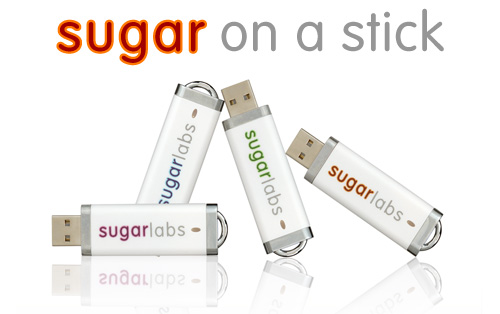Sugar on a Stick/Blueberry
Project Home · Get Involved · Contacts · Resources · FAQ · Roadmap · To Do · Meetings

Sugar on a Stick - Blueberry
- a Sugar environment you can carry in your pocket - this is a draft - work in progress
- TODO: new splash image is needed
- TODO: work website content out
- TODO: add further instructions
This document provides instructions for preparing a Sugar on a Stick (SoaS) installation. It also contains a list of known issues and sources of further information, for example how to use a Boot Helper CD for very old PCs.
Get it!
Please select your operating system by clicking on one of the icons below. Starting with Sugar on a Stick v2 Blueberry, Mac OS X operating systems, OLPC's XO-1 models and virtual appliances are additionally supported.
Windows: Mac OS X: GNU/Linux: OLPC XO-1: Virtual Appliance:
Windows Users
- TODO: add screenshots (we'll use the .iso file here)
- Download the latest version of Fedora LiveUSB Creator from http://fedorahosted.org/liveusb-creator/ and extract it;
- Plug a target USB flash drive into your computer (minimum 1-gigabyte);
- Launch LiveUSB Creator;
- Select Sugar on a Stick (Blueberry) in the drop-down menu on the upper-right side of the LiveUSB Creator window;
- Set the Persistent Storage slider to the maximum so you can save your Sugar work onto the USB device;
- (You may allocate as much storage as there is capacity on your device. You may allocate less than the maximum, if you want to use some of the device storage when not booting Sugar.)
- If you repeat this installation on a device after having saved some Sugar work or changes, all Sugar work and changes will be lost.
- Select your USB flash drive as the target;
- Click the Create Live USB button and then wait for the process to finish (the time required will depend mostly on your download speed);
- Close the LiveUSB Creator program;
- When ejecting the USB flash drive from the computer, first stop the device with the Safely Remove Hardware dialog.
GNU/Linux Users
- TODO: we'll use image-writer here (requires 2-gig key)
- Download the Sugar on a Stick (Blueberry) live image from here: TODO: add link to pre-partitioned image
- Download the image-writer tool from here: TODO: grab working version and put it on dl.sl.o (direct link)
- Open a terminal and become root, either by using su or sudo (the latter one each time on the next commands).
- If necessary, unmount your flash drive by running:
umount /dev/sdX(whereas X is the devices number) - Enter the following command:
./image-writer soas-2-blueberry.imgTODO: check filename - The script will output a device name; confirm that this matches with your flash drive.
- You will be notified once the process has finished, while you can also check the ETA for reference.
Mac Users
- TODO: need to add and test instructions here
- NOTE: While the following method allows you to prepare a Sugar on a Stick flash drive on your Mac, it does not guarantee that you will be able to boot it on the same machine. In this case, you might want to try booting it with our boot helper (TODO: add link) or using a virtual appliance (TODO: add link).
- Download the Sugar on a Stick (Blueberry) live image from here: TODO: add link to pre-partitioned image
- Open a terminal and run
diskutil unmountDisk /dev/diskX(whereas X is the devices number) - Run
sudo dd if=/path/to/downloaded.img of=/dev/diskX bs=1024(NOTE: This will wipe your flash drive entirely!) - Eject your flash drive by running:
diskutil eject /dev/diskX
XO Users
- TODO: need instructions (NAND install)
Appliance Users
- TODO: need instructions, too
- Download and extract the Sugar on a Stick (Blueberry) virtual appliance from here: TODO: add link to virtual appliance
- Download VirtualBox for your operating system from here: http://www.virtualbox.org/wiki/Downloads
- Install it by following the on-screen instructions.
- Start VirtualBox and create a new virtual machine.
- Chose Fedora as Linux version and leave 512 MB for its memory.
- When it comes to selecting the hard disk, select the existing .vmdk file you extracted in step one.
- Follow the process until the end and start your newly created virtual machine then.